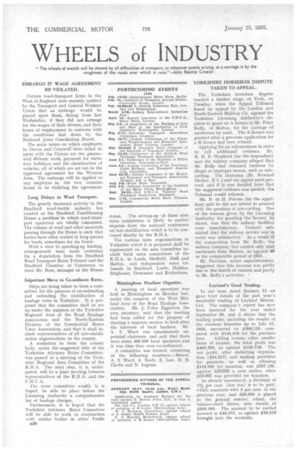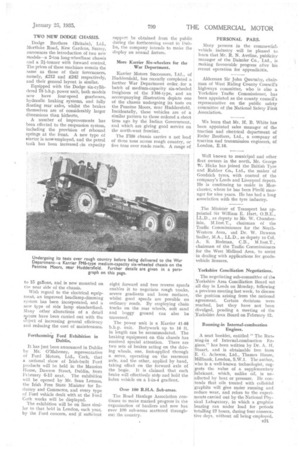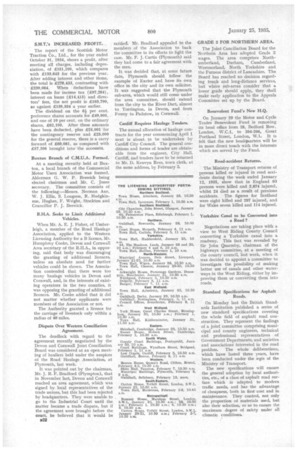WHEELS of INDUSTRY
Page 38

Page 39

Page 40

If you've noticed an error in this article please click here to report it so we can fix it.
" The wheels of wealth will be slowed by all difficulties of transport, at whatever points arising, as a carriage is by the roughness of the roads over which it runs."—John Beattie Crozier.
EMBARGO IF WAGE AGREEMENT BE VIOLATED.
Certain road-transport firms in the West of England were recently notified by the Transport and General Workers Union that an embargo would be placed upon them, dating from last Wednesday, if they did not arrange for the wages of their drivers, and their hours of employment to conform with the conditions laid down by the National Joint Conciliation Board.
The main issues on which employers in Devon and Cornwall have failed to agree with the Unions are the guaranteed 48-hour week, payment for statutory holidays, and the classification of vehicles, all of which are set out in the approved agreement for the Western Area. The embargo will he applied to any employer in the two counties found to be violating the agreement.
Long Delays in Wool Transport.
The greatly increased activity in the Bradford wool-textile industry has created at the Bradford Conditioning House a problem in which road-transport operators are vitally concerned. The volume of wool and other materials passing through the House is such that lorries have often waited in long queues for loads, sometimes for six hours.
With a view to speeding-up loading, arrangements were made yesterday for a deputation from the Bradford Road Transport Rates Tribunal and the Bradford Chamber of Commerce to meet Mr. Barr, manager of the House.
Important Move to Co-ordinate Rates.
Steps are being taken to form a committee for the purpose of co-ordinating and extending the stabilization of haulage rates in Yorkshire. It is proposed that the committee shall be set up under the auspices of the Yorkshire Regional Area of the Road Haulage Association and the North-Eastern Division of the Commercial Motor Users Association, and that it shall include representatives of all rate-stabilization organizations in the county.
A resolution to form the county body, under the suggested title of the Yorkshire Advisory Rates Committee, was passed at a meeting of the Yorkshire Regional Area Committee of the R.II.A. The next step, it is anticipated, will be a joint meeting between representatives of the R.H.A. and the C. M U A.
The rates committee would, it is hoped, be able to place before the Licensing Authority a comprehensive list of haulage charges.
Furthermore, it is hoped that the Yorkshire Advisory Rates Committee will be able to. work in confunction with similar bodies in other Traffic B20 Areas. The setting-up of these area rates committees is likely to receive impetus from the national conference on rate stabilization which is to be convened shortly by the R.H.A.
The various rates organizations in Yorkshire which it is proposed shall be represented on the area committee include local rates committees of the R.H.A. in Leeds, Sheffield, Hull and Malton, and independent rates tribunals in Bradford, Leeds, Halifax, Brighouse, Doncaster and Rotherham.
Birmingham Hauliers Organize.
A meeting of local operators was held in Birmingham on Monday last, under the auspices of the West Midland Area of the Road Haulage Association. Mr. J. Foley Egginton, the area secretary, said that the meeting had been called for the purpose of starting a separate section to look after the interests of local hauliers. Mr. A. S. Ward was unanimously appointed chairman, and said that there were some 400-500 local operators and it was lime they were co-ordinated.
A committee was formed, consisting of the following members:—Messrs. A. S. Ward, A. Neely, E. Law, H. B. Clarke and N. Ingram. YORKSHIRE HORSEBOX DISPUTE TAKEN TO APPEAL.
The Yorkshire horsebox dispute reached a further stage, at York, Oil Tuesday, when the Appeal Tribunal heard an appeal by the London and North-Eastern Railway Co. against the Yorkshire Licensing Authority's de-. cisiort to grant an A licence to Mr. Peter Kelly, of Mallon, for the carriage of racehorses by road. The A licence was granted after a previous application for a B licence had been refused.
Applying for an adjournment in order to call additional evidence, Mr. R. H. B. Shepherd (for the respondent) said the railway company alleged that Mr. Kelly had obtained business by illegal or improper means, such as ratecutting. The chairman (Mr. Rowand Harker, K.C.) said the appeal must proceed, and if it was decided later that the suggested evidence was needed, the Tribunal would adjourn.
Mr. B. de H. Pereira (for the appellant) said he did not intend to proceed with the question of rate-cutting. One of the reasons given by the Licensing Authority for granting the licence, he stated, was that the railway facilities were unsatisfactory. Counsel submitted that the railway service was in every way satisfactory. As a result of the competition from Mr. Kelly, the railway company had carried only Mee racehorses from Malton, as against 99 in the comparable period of 1933.
Mr. Harrison, motor superintendent, suggested that this decrease was partly due to the dearth of runners and partly to Mr. Kelly's activities.
Leyland's Good Trading.
In our issue dated January 11 we gave brief details of the past year's successful trading of Leyland Motors, Ltd. The company's report has now been received for the year ended September 30, and it shcnvs that the trading profit, including the results of the overseas branches up to July 31, 1934, amounted to £396,129, compared with £146,316 for the previous year. Adding certain other smaller items of income, the total profit was £400,299, as against £150,718. The net profit, after deducting depreciation (£64,817) and making provision for pensions, as well as allowing £110,000 for taxation, was £207,136, against £20.622 a year earlier, when £58,807 was provided for taxation.
As already announced, a dividend of 121per cent. (less tax) is to be paid, which contrasts with 5 per cent. in the previous year, and £50,000 is placed to the general reserve, which, the balance-sheet shows, now stands at £500,000. The amount to be carried forward is £46,575, as against £29,520 brought into the accounts. TWO NEW DODGE CHASSIS.
Dodge Brothers (Britain), Ltd., Mortlake Road, Kew Gardens, Surrey, announces the introduction of two new models—a 2-ton long-wheelbase chassis and a 2i-tonner with forward control. The prices of these machines remain the same as those of their forerunners, namely, £212 and £242 respectively, and their general layout is similar.
Equipped with the Dodge six-cyliisdered 78 b.h.p. power unit, both models now have four-speed gearboxes, hydraulic braking systems, and fully floating rear axles, whilst the brakes themselves are of considerably larger dimensions than hitherto.
A number of improvements has been effected to the suspension system, including the provision of rebound springs at the front. A new type of starter is no employed, and the petrol tank has been increased sin capacity to 15 gallons, and is now mounted on the near side of the chassis.
With regard to the electrical equipment, an improved headlamp-dimming system has been incorporated, and a new type of side lamp standardized. Many other alterations of a detail niature have been carried out with the Aject of increasing general efficiency and reducing the cost of maintenance.
Forthcoming Ford Exhibition in Dublin, It has just been announced in Dublin by Mr. O'Mahoney, representative of Ford Motors, Ltd., Cork, that a national show of Irish-built Ford products will be held in the Mansion House, Dawson Street, Dublin, from February 6-13 next, The exhibition will be opened by Mr. Sean Lemass, the Irish Free State Minister for Industry and Commerce, and every type of Ford vehicle dealt with at the Ford Cork works will be displayed. The exhibition will be on lines similar to that held in London, each year, by the Ford concern, and if sufficient support be obtained from the public during the forthcoming event in Dublin, the company intends to make the display an annual fixture.
More Karrier Six-wheelers for the War Department.
Harrier Motors Successors, Ltd., of IIuddersfield, has recently completed a further War Department order for a batch of medium-capacity six-wheeled freighters of the FM6-type, and an accompanying illustration depicts one of the chassis undergoing its tests on the Pennine Moors, near Huddersfield. Incidentally, these vehicles are of a similar pattern to those ordered a short time ago by the Indian Government, and which are giving good service on the north-west frontier.
The FM6 chassis carries a net load of three tons across rough country, or five tons over made roads. A range of eight forward and two reverse speeds enables it to negotiate rough tracks, severe gradients and loose surfaces, whilst good speeds are possible on ordinary roads. By employing chain tracks on the rear wheels, soft sand and boggy ground can also be traversed.
The power unit is a Harrier 41-68 b.h.p. unit. Bodywork up to 16 ft. in length can be accommodated. The braking equipment on this chassis has received special attention. There are two sets of brakes acting on the driving wheels, One, foot-applied through a servo, operating on the rearmost axle, and the other, applied by hand, taking effect on the forward axle of the bogie. It is claimed that each brake will effectively stdp and hold the laden vehicle on a 1-in-4 gradient.
Over 100 R.H.A. Sub-areas.
The Road Haulage Association continues to make marked progress in the organization of hauliers and now has over 100 sub-areas scattered throughout the country. PERSONAL PARS.
Many persons in the commercialvehicle industry will be pleased to learn that Mr. R. N. Aveline, publicity manager of the Daimler Co., Ltd., is making favourable progress after his recent operation for appendicitis.
Alderman Sir John Quarmby, chairman of West Riding County Council's highways committee, who is also a Yorkshire Traffic Commissioner, has been appointed as the county council's representative on the public safety committee of the National Safety First Association.
We learn that Mr. H. B. White has been appointed sales manager of the traction and electrical department of Estler Brothers, Ltd., a company of -traction and transmission engineers, of London, E.16.
Well known to municipal and other fleet owners in the north, Mr. George W. Hicks has joined the British Tyre and Rubber Co., Ltd., the maker of Goodrich tyres, with control of the company's Leeds and Liverpool depots. He is continuing to reside in Manchester, where he has been Pirelli manager for nine years. He has had a long association with the tyre industry.
The Minister of Transport has appointed Sir William E. Hart, 0.B.E„ LL.D., as deputy to Mr. W. Chamberlain, M.Inst.T„ chairman of the Traffic Commissioners for the NorthWestern Area, end Dr. W. Dawson Sadler, M.A., LL.D., as deputy to Col. A. S. Redman, C.B., IVI.Inst.T., chairman of the Traffic Commissioners for the West Midland Area, to assist in dealing with applications for goodsvehicle licences.
• Yorkshire Conciliation Negotiations.
The negotiating sub-committee of the yorkshire Area Conciliation Board sat all day in Leeds on Monday, following a previous meeting last week, to discuss the position arising from the national agreement. Certain decisions were reached, but they have not been divulged, pending a meeting of the Yorkshire Area Board on February 12.
Running-in Internal-combustion Engines.
A neat booklet, entitled " The Running-in of Internal-combustion Engines," has been written by Dr. A. H. Stuart, and is obtainable free from E. G. Acheson, Ltd., Thames House, Millbank, London, S.W.1. The author, who is a well-known technologist, suggests the value of a supplementary lubricant, which, unlike oil, is unaffected by heat or pressure. He contends that oils treated with colloidal graphite will give easier running and reduce wear, and refers to the experiments carried out by the National Physical Labnratory, in which a graphite bearing ran under load for periods totalling 27 hours, during four consecutive days, without oil being employed. S.M.T.'s INCREASED PROFIT.
The report of the Scottish Motor Traction Co., Ltd., for the year ended October 31, 1934, shows a profit, after meeting all charges, including depreciation, of £151,100, which compares with £133,643 for the previous year. After adding interest and other items, the total is £278,433, contrasting with £239,084. When deductions have been made for income tax (£97,264), interest on loans (£14,4.15) and directors' fees, the net profit is £163,790, as against £139,334 a year earlier.
The dividend on the 6} per cent. preference shares accounts for £49,905, and one of 10 per cent, on the ordinary shares, £62,199. After these amounts have been deducted, plus £24,001 for the contingency reserve and £25,000 for the general reserve, there is a carry forward of £60,081, as compared with £57,396 brought into the accounts.
Buxton Branch of C.M.U.A. Formed.
At a meeting recently held at Buxton, a local branch of the Commercial Motor Users Association was formed, Alderman G. W. P. Beswick being elected chairman and Mr. C. Jones secretary. The committee consists of the following:—Messrs. Norman Axe, W. J. Ellis, S. Longson, R. Hodgkinson, Hughes, F. Wright, Stockton and Councillor P. J. Heswick.
R.I-LA. Seeks to Limit Additional Vehicles.
When Mr. A. E. J. Fisher, of Umberleigh, a member of the Road Haulage Association, applied to the Western Licensing Authority for a B licence, Mr. Humphrey Cooke, Devon and Cornwall Area secretary of the R.II.A., in opposing, said that body was discouraging the granting of additional licences, unless an absolute need for further vehicles could be shown. The Association contended that there were too many haulage vehicles in Devon and Cornwall, and, in the interests of existing operators in the two counties, it was opposing the granting of additional licences. Mr. Cooke added that it did not matter whether applicants were members of the Association or not.
The Authority granted a licence for the carriage of livestock only within a radius of 40 miles.
Dispute Over Western Conciliation Agreement.
The deadlock with regard to the agreement recently negotiated by the Devon and Cornwall Joint Conciliation Board was considered at an open meeting of hauliers held under the auspices of the Road Haulage Association, at Plymouth, last week.
It was pointed out by the chairman, Mr. J. R. F. Bradford (Plympton), that in November last, Devon and Cornwall reached an area agreement, which was signed by local representatives of the trade unions, but this had been rejected by headquarters. They were unable to go to the Industrial Court until the matter became a trade dispute, but if the agreement were brought before the court, he believed that it would be B22 ratified. Mr. Bradford appealed to the members of the Association to back the committee in its efforts to fight the case. Mr. F. J. Curtis (Plymouth) said they had come to a fair agreement with the men.
It was decided that, at some future date, Plymouth should follow the example of Exeter and have its own office in the city and its own solicitor. It was suggested that the Plymouth sub-area, which would still come under the area committee, should extend from the city to the River Dart, almost to Torrington, in Devon, and from Fowey to Padstow, in Cornwall.
Cardiff Requires Haulage Tenders.
The annual allocation of haulage contracts for the year commencing April 1 next is about to be undertaken by Cardiff City Council. The general conditions and forms of tender are obtainable from the engineer, City Hall. Cardiff, and tenders have to be returned to Mr. D. Kenvyn Rees, town clerk, at the same address, by February 5. GRADE 2 FOR NORTHERN AREA.
The Joint Conciliation Board for the Northern Area has adopted Grade 2 wages. The area comprises Northumberland, Durham, Cumberland, Westmorland, North Yorkshire and the Furness district of Lancashire. The Board has reached no decision regarding trunk and long-distance services, hut. where sub-areas consider that a lower grade should apply, they shall make early application to the Appeals Committee set up by the Board.
Benevolent Fund's New H.Q.
On January 29 the Motor and Cycle Trades Benevolent Fund is removing its head office from 28, Bedford Row, London, W.C.1, to 204-206, Great Portland Street, London, W.1. It is felt that the new headquarters will be in more direct touch with the interests which are served by the Fund.
Road-accident Returns.
The Ministry of Transport returns of persons killed or injured in road accidents during the week ended January 12, 1935, show that in England 93 persons were killed and 2,874 injured, whilst 24 died as a result of previous accidents. The figures for Scotland were eight killed and 297 injured, and for Wales seven killed and 114 injured.
Yorkshire Canal to be Converted into a Road ?
Negotiations are taking place with a view to West Riding County Council converting a Yorkshire canal into a roadway. This fact was revealed by Sir John Quarmby, chairman of the highways committee, at a meeting of the county council, last week, when it was decided to appoint a committee to investigate the possibility of making better use of canals and other waterways in the West Riding, either by improving them or converting them into roads.
Standard Specifications for Asphalt Roads.
On Monday last the British Standards Institution published a series of new standard specifications covering the whole field of asphalt road construction. They represent the findings of a joint committee comprising municipal and county engineers, technical and professional representatives of Government Departments, and societies and associations interested in the road problem. The whole deliberations, which have lasted three years, have been conducted under the regis of the Ministry of Transport.
The new specifications will ensure the general adoption by local authorities, etc., of a class of asphalt road surface which is adapted to modern traffic needs, and has the advantage of cheapness, both in first cost and in maintenance. They control, not only the proportion of materials used, but also their selection, so as to ensure the maximum degree of safety under all climatic conditions.




































































































